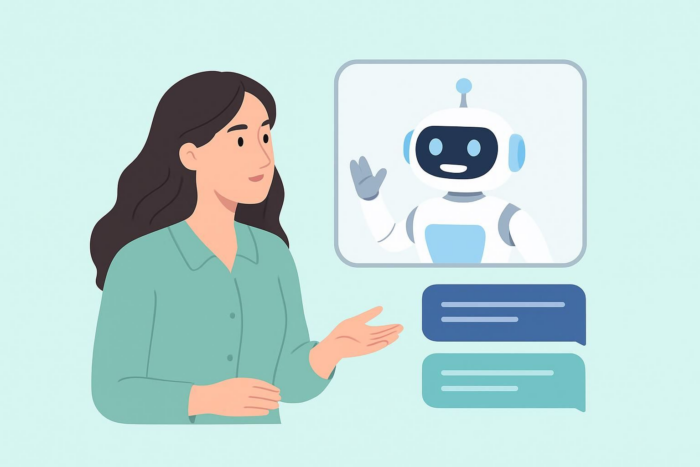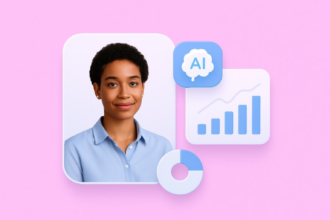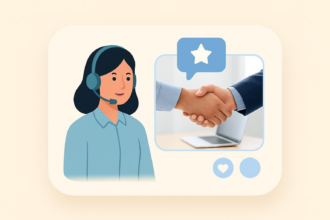Without good customer service, organizations are bound to fail. Customers are looking for fast, helpful, and engaging service at all hours of the day — if they have just one bad experience, over half of consumers are willing to switch to a competitor. And news spreads, which means 79 percent of consumers are prepared to go to a different company if they hear it delivers better customer service.
So how can organizations rise to the challenge? They can start by taking advantage of artificial intelligence (AI).
In order to deliver the kind of customer experience consumers want, leading organizations are implementing AI tools that transform operations and drive considerable value — helping them manage operational costs while providing exceptional results.
In this article, we’ll look at the future of AI in customer service, as well as the ethical challenges and limitations of AI. Plus, we’ll show you how Jotform’s AI Agent solution can help you wow customers with your level of service.
The role of AI in customer service
Artificial intelligence tools used in customer service provide a number of advantages — the most important of which is automation. With AI tools, organizations can automate manual workflows so they can respond to customers at scale, at all hours of the day and night — regardless of how many human customer service agents are currently available.
But AI doesn’t simply replace human agents. AI customer service tools increase efficiency, allowing human representatives to take over more complex issues while AI handles everything else. As a result, your organization can serve more customers at one time, while keeping your costs in check.
They can also help to personalize your customer service interactions, with tools being able to offer purchasing suggestions or payment options based on an individual’s past behavior and buying history.
But one size never fits all, which is why these AI tools come in many forms:
- Chatbots: Typically used on company websites and social media channels, chatbots help companies field basic questions from customers — for example, queries related to hours, locations, products, available stock, and more. More complex chatbots can also personalize answers based on previous interactions, and triage customer inquiries to human representatives. As such, chatbots are often seen as the frontline of customer service.
- AI-powered virtual assistants: More sophisticated than chatbots, AI-powered virtual assistants help customer service representatives with administrative tasks, such as booking appointments, sending out email reminders, fielding phone calls, and more. They enable human representatives to handle the more strategic tasks while the tool takes over the tedious, repetitive ones.
- AI agents: AI agents have more advanced capabilities than assistants and chatbots — what sets them apart is their ability to act autonomously. Human agents task AI agents with specific goals to complete, and the agents can do so with minimal human oversight. Many AI agents can also field questions (like chatbots) and complete administrative tasks (like virtual assistants).
- Sentiment analysis tools: In the field of customer service, it’s vital for you to know how consumers feel about your brand. AI sentiment analysis tools crawl content posted by consumers, such as through social media feeds, to determine what people are saying about your business.
Beyond this, many AI functions now come as standard with other customer service and productivity tools — meaning you can leverage project management, scheduling, communication, note-taking, and more to provide excellent service all-round.
Current trends in AI-powered customer service
The future of customer service is always evolving, as expectations change based on the market, consumer trends, and basic needs. Customer service tools that use artificial intelligence are highly versatile, so they can keep up with evolving customer expectations.
The growth of conversational AI
Often used in chatbots and AI virtual assistants, Conversational AI enables organizations to “talk” to customers at scale, with hundreds of written or spoken conversations happening at once. About 80 percent of CEOs plan to adjust how their business engages with clients as a result of advancing conversational AI technologies. And nearly half of customers don’t mind if they’re helped by an AI bot or a human, as long as they get the assistance they need.
The use of predictive analytics for proactive customer service
Artificial intelligence tools can analyze a huge amount of data, from customer interactions and support tickets to emails and purchase histories, in order to determine potential outcomes for customers.
For example, AI may even be able to determine which types of customers are most likely to abandon carts or have issues making payments on time. As a result, you can proactively attempt to resolve issues, such as providing incentives to complete a purchase or offering a payment plan.
The rise of omnichannel customer service strategies
Customers can be unpredictable; sometimes they reach out via email, other times via social media. AI tools can intelligently aggregate interactions at scale and create a unified customer profile so that your business can provide personalized customer service regardless of where the customer is.
And you can expect to reap huge rewards from doing so. Businesses that have strong omnichannel customer engagement strategies retain 89 percent of their customers, while businesses that have weak omnichannel customer engagement strategies only retain 33 percent.
Ethical challenges and limitations of AI in customer service
Applying AI in customer service offers organizations a number of advantages. However, it’s always important to keep the challenges of the technology in mind to ensure the benefits outweigh the limitations for your business:
- Potential bias: One challenge to be aware of is the possibility of inadvertently introducing bias into your customer service interactions as a result of AI. If the AI tool has been trained on biased data, the AI’s outcomes will likely be biased as well — which can impact how the AI interacts with your customers.
- Data privacy: Some customers may have issues with data privacy and would prefer to avoid giving their confidential information to an AI chatbot. Organizations must ensure their AI technology is as secure as possible to build consumer trust. Vet your top choices carefully by reading customer reviews and paying attention to customer ratings.
- Lack of empathy: While AI can handle questions, provide information, book appointments, and complete other tasks for customers, it can’t empathize with customers when they’re having a bad day. Ensure the human aspect of customer service remains a focal point in your customer service strategy so that customers remember how your organization makes them feel.
- AI-human balance: There are many applications for AI in customer service, but it’s important to maintain a balance between automation and the human touch. After all, so much of customer service is about building relationships.
No matter what tool or function you’re using AI for, it’s vital to establish trust through transparency. For instance, it’s best practice for organizations to inform customers when they are interacting with an AI bot versus a human. If you don’t inform them, and customers find out on their own, they could feel deceived and develop a negative impression of your company.
The future impact of AI in customer service
Artificial intelligence technology is rapidly evolving. What will future customer service AI tools be able to accomplish? Here are some possibilities…
Hyper-personalization
- Use case: Personalized customer service interactions are already taking place. In the future, however, we’re likely to see increased personalization across channels.
- Benefit: Organizations will use AI to collect more detailed data about their customers through interactions and behavior patterns. They will then use that information to tailor customer experiences, which helps build loyalty.
- Example: Chatbots and virtual assistants can offer personalized product recommendations, payment options, service plans, and more.
Increased operational efficiency
- Use case: AI enables customer service teams to handle issues at a massive scale, satisfying more customers in less time.
- Benefit: With the shift toward highly autonomous customer support systems, organizations will be able to further increase efficiency.
- Example: AI agents will become increasingly common, handling many customer tasks without human intervention. This will allow human customer service reps to focus on the more challenging customer service issues that require a human touch.
Shifting customer service roles
- Use case: It’s likely that customer service jobs will continue to change over the next few years as AI tools evolve.
- Benefit: Admin, like call-handling and appointment scheduling, can be shifted to AI reps instead, leaving human agents to deal with complex complaints, and saving organizations money on staff training and onboarding.
- Example: New or expanded roles may also emerge around the human aspects of customer service, particularly the all-important skill of relationship-building.
Integration of emotional intelligence
- Use case: Artificial intelligence tools will never be able to feel human emotion. However, they may get better at emulating human emotions and responding to customers with emotional intelligence.
- Benefit: This will become particularly useful in tense customer service situations where customers are upset, as AI can work to deescalate the situation without handing off to a human agent.
- Example: Emotionally intelligent AI tools will be better at understanding customers when they are exhibiting strong emotions, and providing appropriate responses.
How Jotform AI Agents help you stay ahead
With so many AI customer service tools on the market, it can be difficult to narrow down your options. One tool that stands out is Jotform AI Agents.
Jotform AI Agents is a powerful and fully automated customer service tool organizations can use to enhance the customer service experience, as well as
- Offer customers real-time assistance via multiple channels, such as your website and social media.
- Use automation to answer user questions about your business, products, and services.
- Guide customers through administrative processes like filling out forms.
- Troubleshoot customer issues and find resolutions fast.
Jotform AI Agents offers organizations a number of benefits, such as 24/7 availability, streamlined customer support workflows, and reduced response times — all of which combine to enhance customer satisfaction.
Getting started with Jotform AI Agents is easy and doesn’t require any coding experience:
- Simply choose an AI Agent template, create your own from scratch, or clone an existing form.
- Train the agent with data from your organization.
- Customize it to meet the needs of your business.
Jotform’s AI Agent templates come with over 7,000 ready-to-use agents, 1,000 of which are specifically for customer service processes — and the best part is, they’re completely free.
For example, use the Customer Support AI Agent to act as your interactive assistant, capturing essential data from customers through dynamic conversations. Or try the User Feedback Manager AI Agent, which guides users through surveys, reviews, and other experience-sharing documents.
How will you transform customer service with AI?
Artificial intelligence tools are transforming the customer service industry by personalizing interactions, increasing efficiency, and enabling organizations to engage with customers at scale. Customer service roles are already shifting as a result of AI tools. If your organization hasn’t prepared for an AI-driven future, it’s important to start now so you don’t get left behind.
If you want to keep up with competitors and offer customer-centric service your clients will love, it’s time to embrace AI technology and use it to enhance your level of customer service.
Jotform AI Agents is a great place to start. It doesn’t require any coding knowledge, is easy to use, and offers a free plan. Give Jotform AI Agents a try today, and see how it can take your customer service to the next level.
This article is aimed at business owners, customer service leaders, and operations managers who want to leverage artificial intelligence to improve support quality, boost efficiency, and maintain a competitive edge.

































Send Comment: